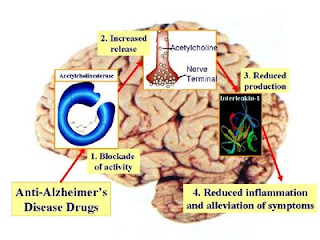Treatment Options
Those diagnosed with Alzheimer’s live an
average of eight years after their symptoms become visible to others. However,
most patients can survive for up to twenty years depending on the age and
overall health status. Currently, there is no cure for Alzheimer’s because the
mutations that occur in the brain during the disease are permanent. Once the
nerve cells begin to die, and the brain begins to shrink, it can not be
reversed.
However, medications can be provided to help cope with the drastic
changes that occur in the brain of the patient. There are medications for
memory loss, sleep changes, and behavioural changes. These medications cannot
cure Alzheimer’s or stop it from spreading, but it can curb the symptoms and
slow it down for some time. The two types of medications used to treat memoryloss and confusion are cholinesterase inhibitors (such as Donepezil,
Rivastigmine, and Galantamine) and memantine. Medications used to treat sleep
changes include nortriptyline, trazodone, lorazepam, oxazepam, temazepam,
zolpidem, zaleplon, chloral hydrate, risperidone, onlanzapine, quetiapine, and
haloperidol.
Learn more: How does Alzheimer’s affect the Brain? (pathology of Alzheimer's disease) Symptoms of Alzheimer’s disease, alternative (herbal) therapy for Alzheimer disease, alzheimer's disease (and memory loss)- a form of dementia
tags: alzheimer’s disease meaning, alzheimer’s disease causes, how does alzheimer’s disease occur, alzheimer’s disease symptoms, alzheimer’s disease stages, alzheimer’s disease risk factors, alzheimer’s disease stages, alzheimer pathology, alzheimer’s disease prevention, alzheimer’s disease control, alternative treatment of alzheimer’s disease (herbal therapy)
FOLLOW ME…AND PLEASE DON’T FORGET TO SHARE… SAVE A LIVE
TODAY





















0 comments:
Post a Comment